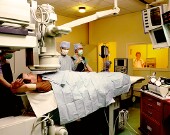- Double Mastectomy May Offer No Survival Benefit to Women With Breast Cancer
- Toxic Lead Found in Cinnamon Product, FDA Says
- Certain Abbott Blood Sugar Monitors May Give Incorrect Readings
- Athletes Can Expect High Ozone, Pollen Counts for Paris Olympics
- Fake Oxycontin Pills Widespread and Potentially Deadly: Report
- Shingles Vaccine Could Lower Dementia Risk
- Your Odds for Accidental Gun Death Rise Greatly in Certain States
- Kids From Poorer Families Less Likely to Survive Cancer
- Tough Workouts Won’t Trigger Cardiac Arrest in Folks With Long QT Syndrome
- At-Home Colon Cancer Test Can Save Lives
Surgery With Follow-Up Radiation Best for Tongue Cancer: Study


People with tongue cancer who undergo surgery before receiving radiation treatment fare better than those who start treatment with chemotherapy, according to a small new study.
Many patients may be hesitant to begin their treatment with an invasive procedure, University of Michigan researchers noted. But advanced surgical techniques can improve patients’ chances for survival, the authors noted in a university news release.
The study was published online Dec. 26 in JAMA Otolaryngology Head and Neck Surgery.
Nearly 14,000 Americans will be diagnosed with tongue cancer this year and 2,070 will die from the disease, according to the American Cancer Society.
“To a young person with tongue cancer, chemotherapy may sound like a better option than surgery with extensive reconstruction,” study author Dr. Douglas Chepeha, a professor of otolaryngology-head and neck surgery at the University of Michigan Medical School, said in the news release.
“But patients with oral cavity cancer can’t tolerate induction chemotherapy as well as they can handle surgery with follow-up radiation,” Chepeha said. “Our techniques of reconstruction are advanced and offer patients better survival and functional outcomes.”
The study involved 19 people with advanced oral cavity [mouth] cancer. All of the participants were given an initial dose of chemotherapy (called “induction” chemotherapy). Patients whose cancer was reduced in size by 50 percent received more chemotherapy as well as radiation therapy.
Those who did not respond well to the first dose of chemotherapy underwent surgery. After surgery these patients also received radiation.
The researchers reported that their study was stopped early because the results were so dismal. Ten of the patients responded to chemotherapy. Of these people, only three were cancer-free five years later.
Only two of the remaining nine patients who underwent surgery after the initial dose of chemotherapy were alive and cancer-free after five years, the researchers found.
After examining a similar group of patients who had surgery and advanced reconstruction followed by radiation therapy, the researchers found dramatic improvements in survival rates and other outcomes, according to the news release.
However, the new findings contradict the typical course of treatment for people with larynx (voice box) cancer, the news release noted. These patients are given an initial dose of chemotherapy to determine whether or not they should proceed with surgery. This approach has led to improved outcomes and survival rates for these patients.
“The mouth is a very sensitive area. We know the immune system is critical in oral cavity cancer, and chemotherapy suppresses the immune system. If a person is already debilitated, they don’t do well with chemotherapy,” Chepeha said. “Despite the proven success of this strategy in laryngeal cancer, induction chemotherapy should not be an option for oral cavity cancer, and in fact it results in worse treatment-related complications compared to surgery.”
Although the study found an association between receiving surgery before radiation therapy and improved outcomes for patients with tongue cancer, it did not prove a cause-and-effect relationship.
More information
The U.S. Centers for Disease Control and Prevention provides more information on oral cancer.
Source: HealthDay
Copyright © 2024 HealthDay. All rights reserved.










